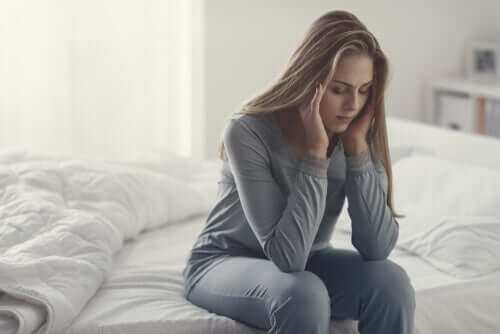Anxiety is a complicated opponent who gives little respite, of course, never arrives at the most opportune time of day and is usually present from an early age, it is anxiety when waking up or morning anxiety.
The first shadow we see are these obsessive and circular thoughts, this expectation and this physiological activation, anxiety when waking up in the morning can condition the rest of the day, generating an intense fear of obstacles or challenges that may arise.
- Anxiety when waking up can be really limiting for people who aren’t able to handle it properly.
- So in this article.
- We’ll make some recommendations that.
- While seemingly simple.
- Can revolutionize a day we were just waiting for suffering from.
We open our eyes and feel anxiety. Then begins this feeling of discomfort that results in a physiological activation, a possible desire to cry, disbelief in itself, a apprehended expectation and, at some point, the desire not to start the day.
We may have an encounter with a stranger, a party with friends, the need to go shopping or attend practices and college, whatever our plans of the day, the truth is that anxiety discourages us, makes us want to flee.
Therefore, it is important to put an end to these catastrophic thoughts that are sinking our day, which is just beginning, to end, it is no coincidence that these thoughts infiltrate our internal dialogue when we are in bed.
In fact, techniques such as “leisure” prevent the person from confronting their obsessive thoughts both in the morning and at night.
Can circular thoughts intensify when the person is doing an activity?How to stay in bed?red carpet for this emotion, inviting them in.
When we start detecting signs that our anxiety is on the rise, now is the time: get out of bed.
Avoidance, as a strategy, will only increase anxiety. These situations do not necessarily have to be specific stimuli that always trigger this activation, such as in the case of a snake or a dentist appointment.
Anxiety may suggest that we are not attending class, for example, because our catastrophic cyclic thoughts and discouragement lead us to believe that we will not be able to overcome the challenges of activity.
Through the Anxiety and Anxiety Avoidance Mechanism, the person may prefer not to attend the internship, but won’t it reduce long-term anxiety?Although in the short term it is.
However, the next time we have to go to an internship, will the anxiety be even greater?Because we haven’t distorted catastrophic thoughts on the subject, why aren’t we exposed to the situation?And it will further weaken our mood if we hadn’t. achieved our goal of the day.
So, while getting up anxiously is difficult, not doing our activities will make the situation even more difficult, if we have a day full of activities/links and don’t do any, they will just accumulate.
To alleviate anxiety, the ideal is to expose ourselves to what scares us, even when we feel anxious, often, actually, the barriers we imagine present less difficulty than we anticipate, or are less vulnerable than we think.
Although we’re used to drinking coffee and eating a piece of cake in the mornings, is caffeine a heart rate-boosting stimulant?Physiological manifestation that can be confused with anxiety.
Caffeine can be very positive for the body to activate, but it can be a negative factor when we are already activated, we do not want to stimulate this tachycardia, which can then have a domino effect on increased breathing, sweating and, in general, on physical symptoms of anxiety, sometimes so frightening.
Anxiety when waking up should be a sign that coffee may not be the most recommended drink that morning. Susan Bowling, Women’s Psychologist? S Health Center discusses the relationship between coffee and anxiety as follows:
“The natural effects of caffeine stimulate a large accumulation of sensations, such as a faster heart rate, an increase in body temperature, an increase in heart rate . . . all these things simulate anxiety. Psychologically, it is difficult for the mind to recognize these sensations derived from coffee because they feel the same way as those that result from anxiety.
The last of the recommendations adopted to avoid anxiety when waking up leads us to lose the day, is personal care. Care and hygiene habits are simple activities that, in a way, calm our mood.
When we wake up anxiously, it is important to follow active and conscious strategies in relation to it, anxiety is mixed with catastrophic, irrational and negative thoughts that constantly tell us that we are worthless, that we are small and that we will not reach. We’re in danger because we can’t get out of this state.
In this way, escaping the right jacket and dressing in clothes with which we feel comfortable, beautiful and powerful can be a perfect shield against these harmful cognitions, simple actions that can have a crucial impact on our feelings of self-efficacy and our weakened self-image.
Finally, it seems appropriate to point out that people should not feel compelled to control their anxiety.
Constantly coping with feelings of anxiety can be a symptom of a disorder that the person does not necessarily have to face alone, if anxiety affects their overall, social, family, emotional or professional functioning, it is recommended to start psychological treatment.

